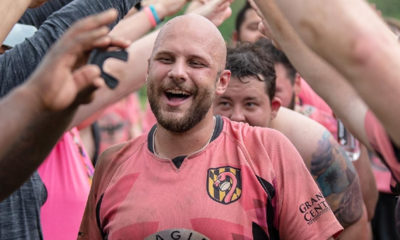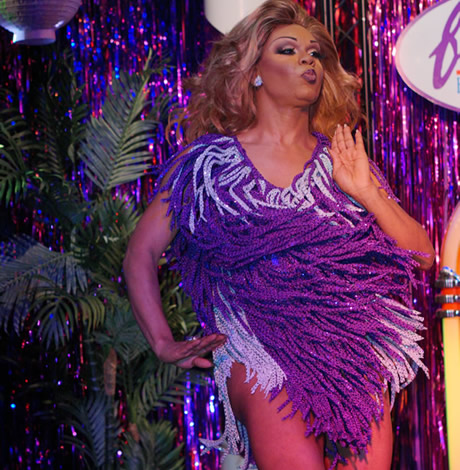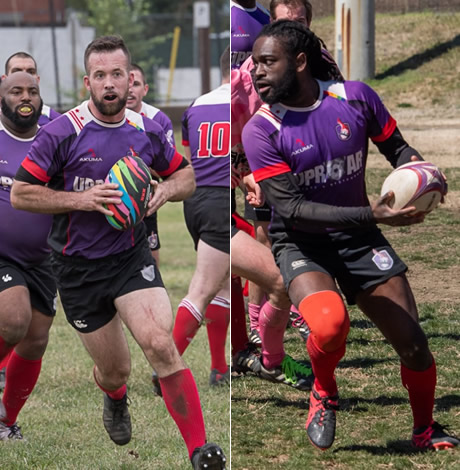Sports
D.C.-based gay rugby team draws diverse players
Local players Joshua Street, Shane Hickey find camaraderie in Washington Scandals
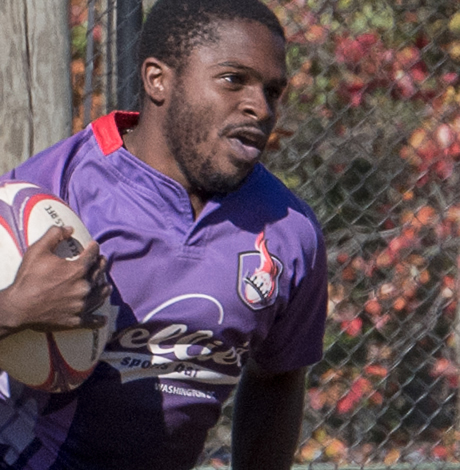
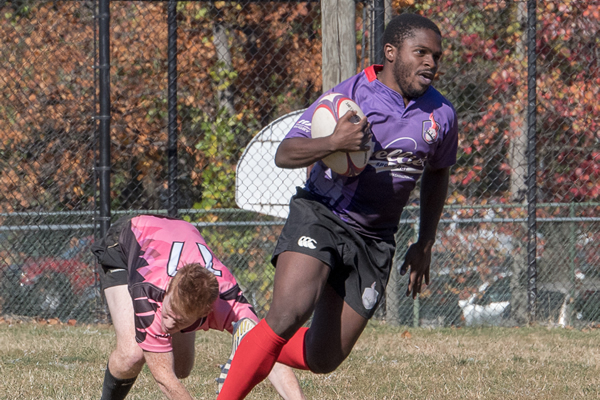
Joshua Street (Photo by Eric Brown)
This week in the continuing spotlight series on the LGBT sports community in Washington, we visit with two gay rugby players from the Washington Scandals.
The Scandals were formed in 2013 and have carved out a niche playing in weekend matches along with traveling to tournaments along the Eastern Seaboard. Next year they will attend their first match overseas when they journey to Bingham Cup 2018 in Amsterdam.
After graduating from Georgetown University, Joshua Street found himself settling into the routine of life after college. Work, gym and then home. It was a pattern he was looking to change.
He had heard good things about the Washington Scandals and signed up to play when he saw them at Capital Pride in 2016. He went through their conditioning first and then had an eye-opening visual at his first practice.
“I saw this really big guy tackle a small guy and I immediately wondered if a theater major should be attempting to fit into this culture,” Street says. “The team was super supportive and assured me that when I was ready, they would get me there.”
Street, who works in insurance and risk management, was born in Texas and grew up in Surinam, and Antigua and Barbuda with his Southern Baptist missionary parents. His athletic endeavors consisted of intramural soccer and volleyball.
His first rugby match with the Scandals was in Toronto and he says that it was a good learning experience and crash course into the sport of rugby.
“I tested everything that the Scandals had taught me, especially that you have to push through obstacles whether they are mental or physical,” Street says. “It was very satisfying to be able to put what I had learned in practice into a game situation and amazing to think that I was a rugby player.”
Since that first match in Toronto, Street has settled into the rugby community and has traveled with his teammates to Charleston, Philadelphia, Charlotte and Baltimore. He’s social chair for the Scandals and loves the way the gay rugby community pushes each other in a game then gets together socially afterwards.
“There is always trepidation before a game because you know you are going to take some hits. All the nerves end up falling away because all these cogs are in motion and working as a team,” Street says. “I have found what I was looking for with the Scandals by getting out of that daily routine and finding an incredible support system.”
As a young kid in Liverpool, N.Y., Shane Hickey tried multiple sports including cross-country running but never found one that he fell in love with. He took a break from sports activities while attending Georgetown University where he was active on the school newspaper.
His path changed after a Scandals player told him he looked like someone who could play rugby. He signed up to play in September of 2013 and found himself smitten.
“My first practice was on a Thursday and my first match was two days later. It was trial by fire and I fell in love immediately,” Hickey says. “Realizing that I had so much more to learn was both a thrill and a rush.”
Hickey, who works in interlibrary services at American University, wasn’t sure if he could handle the sport at first but after years of playing, he has found happiness in being part of the rugby community. He’s a co-captain and is in his third year as a Scandals board member.
“This environment creates a space that allows people to learn about themselves which is one of the reasons I continue to be involved,” Hickey says. “Playing other teams who are just like us is amazing and our tournaments and matches become weekend events.”
Hickey has also traveled extensively with the Scandals and says he will continue with the team even if he ever gets to a point where he can’t play anymore. He’s taking courses to become certified as a referee.
“I love rugby and I love the brotherhood. It has made me a lot more confident as a person and has become a huge focus in my life. All rugby, all the time,” Hickey says. “Another plus has been that the team has exposed me to the LGBT community.”
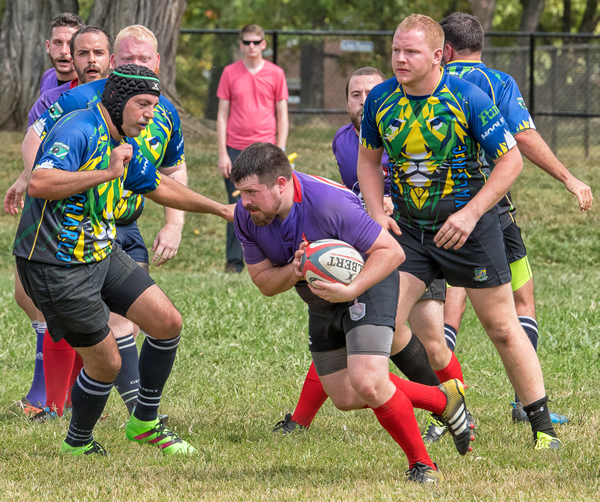
Shane Hickey (Photo by Eric Brown)
Sports
US wins Olympic gold medal in women’s hockey
Team captain Hilary Knight proposed to girlfriend on Wednesday

The U.S. women’s hockey team on Thursday won a gold medal at the Milan Cortina Winter Olympics.
Team USA defeated Canada 2-1 in overtime. The game took place a day after Team USA captain Hilary Knight proposed to her girlfriend, Brittany Bowe, an Olympic speed skater.
Cayla Barnes and Alex Carpenter — Knight’s teammates — are also LGBTQ. They are among the more than 40 openly LGBTQ athletes who are competing in the games.
The Olympics will end on Sunday.
Sports
Attitude! French ice dancers nail ‘Vogue’ routine
Cizeron and Fournier Beaudry strike a pose in memorable Olympics performance

Madonna’s presence is being felt at the Olympic Games in Italy.
Guillaume Cizeron and his rhythm ice dancing partner Laurence Fournier Beaudry of France performed a flawless skate to Madonna’s “Vogue” and “Rescue Me” on Monday.
The duo scored an impressive 90.18 for their effort, the best score of the night.
“We’ve been working hard the whole season to get over 90, so it was nice to see the score on the screen,” Fournier Beaudry told Olympics.com. “But first of all, just coming out off the ice, we were very happy about what we delivered and the pleasure we had out there. With the energy of the crowd, it was really amazing.”
Watch the routine on YouTube here.
Italy
Olympics Pride House ‘really important for the community’
Italy lags behind other European countries in terms of LGBTQ rights

The four Italian advocacy groups behind the Milan Cortina Winter Olympics’ Pride House hope to use the games to highlight the lack of LGBTQ rights in their country.
Arcigay, CIG Arcigay Milano, Milano Pride, and Pride Sport Milano organized the Pride House that is located in Milan’s MEET Digital Culture Center. The Washington Blade on Feb. 5 interviewed Pride House Project Manager Joseph Naklé.
Naklé in 2020 founded Peacox Basket Milano, Italy’s only LGBTQ basketball team. He also carried the Olympic torch through Milan shortly before he spoke with the Blade. (“Heated Rivalry” stars Hudson Williams and Connor Storrie last month participated in the torch relay in Feltre, a town in Italy’s Veneto region.)
Naklé said the promotion of LGBTQ rights in Italy is “actually our main objective.”
ILGA-Europe in its Rainbow Map 2025 notes same-sex couples lack full marriage rights in Italy, and the country’s hate crimes law does not include sexual orientation or gender identity. Italy does ban discrimination based on sexual orientation in employment, but the country’s nondiscrimination laws do not include gender identity.
ILGA-Europe has made the following recommendations “in order to improve the legal and policy situation of LGBTI people in Italy.”
• Marriage equality for same-sex couples
• Depathologization of trans identities
• Automatic co-parent recognition available for all couples
“We are not really known to be the most openly LGBT-friendly country,” Naklé told the Blade. “That’s why it (Pride House) was really important for the community.”
“We want to use the Olympic games — because there is a big media attention — and we want to use this media attention to raise the voice,” he added.

Naklé noted Pride House will host “talks and roundtables every night” during the games that will focus on a variety of topics that include transgender and nonbinary people in sports and AI. Another will focus on what Naklé described to the Blade as “the importance of political movements now to fight for our rights, especially in places such as Italy or the U.S. where we are going backwards, and not forwards.”
Seven LGBTQ Olympians — Italian swimmer Alex Di Giorgio, Canadian ice dancers Paul Poirier and Kaitlyn Weaver, Canadian figure skater Eric Radford, Spanish figure skater Javier Raya, Scottish ice dancer Lewis Gibson, and Irish field hockey and cricket player Nikki Symmons — are scheduled to participate in Pride House’s Out and Proud event on Feb. 14.
Pride House Los Angeles – West Hollywood representatives are expected to speak at Pride House on Feb. 21.
The event will include a screening of Mariano Furlani’s documentary about Pride House and LGBTQ inclusion in sports. The MiX International LGBTQ+ Film and Queer Culture Festival will screen later this year in Milan. Pride House Los Angeles – West Hollywood is also planning to show the film during the 2028 Summer Olympics.
Naklé also noted Pride House has launched an initiative that allows LGBTQ sports teams to partner with teams whose members are either migrants from African and Islamic countries or people with disabilities.
“The objective is to show that sports is the bridge between these communities,” he said.
Bisexual US skier wins gold
Naklé spoke with the Blade a day before the games opened. The Milan Cortina Winter Olympics will close on Feb. 22.
More than 40 openly LGBTQ athletes are competing in the games.
Breezy Johnson, an American alpine skier who identifies as bisexual, on Sunday won a gold medal in the women’s downhill. Amber Glenn, who identifies as bisexual and pansexual, on the same day helped the U.S. win a gold medal in team figure skating.
Glenn said she received threats on social media after she told reporters during a pre-Olympics press conference that LGBTQ Americans are having a “hard time” with the Trump-Vance administration in the White House. The Associated Press notes Glenn wore a Pride pin on her jacket during Sunday’s medal ceremony.
“I was disappointed because I’ve never had so many people wish me harm before, just for being me and speaking about being decent — human rights and decency,” said Glenn, according to the AP. “So that was really disappointing, and I do think it kind of lowered that excitement for this.”
-

 Baltimore4 days ago
Baltimore4 days ago‘Heated Rivalry’ fandom exposes LGBTQ divide in Baltimore
-

 Real Estate4 days ago
Real Estate4 days agoHome is where the heart is
-

 District of Columbia4 days ago
District of Columbia4 days agoDeon Jones speaks about D.C. Department of Corrections bias lawsuit settlement
-

 European Union4 days ago
European Union4 days agoEuropean Parliament resolution backs ‘full recognition of trans women as women’

